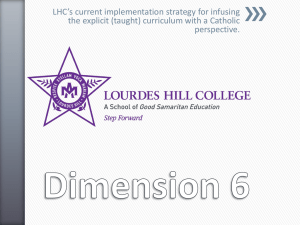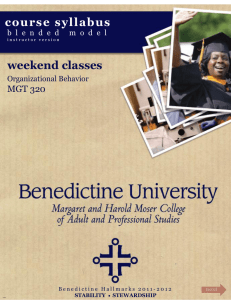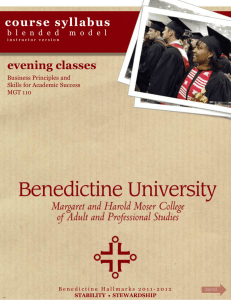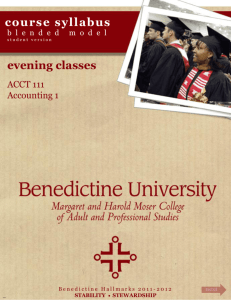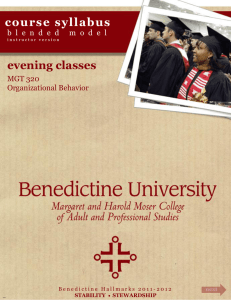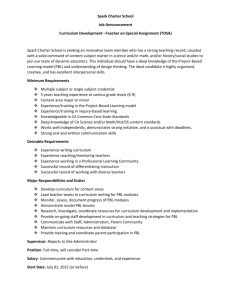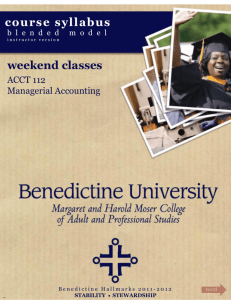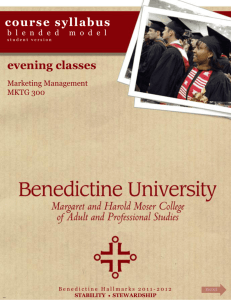Learning Objectives - MoserCollegeHypermediaSyllabi
advertisement
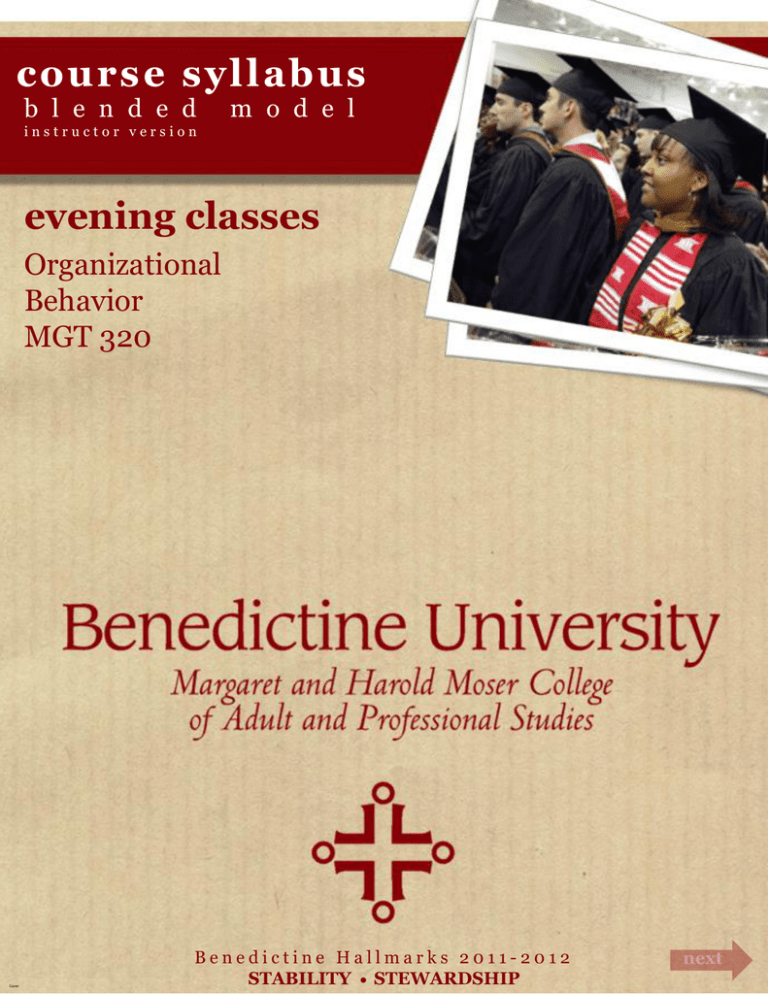
course syllabus b l e n d e d m o d e l instructor version evening classes Organizational Behavior MGT 320 home Cover about expectations resources course overview learning outcomes Benedictine Hallmarks 2011-2012 STABILITY STEWARDSHIP IDEA schedule & sessions next course syllabus Addresses the educational needs of adult students by developing and providing engaging, relevant and accelerated programs. blended model MGT 320 Enhances scholarship, leadership skills, social responsibility, and promotes life-long learning. Provides high-quality, easily accessible educational opportunities for adult learners. Enables adults to earn specific undergraduate and graduate degrees while maintaining their personal and professional commitments. Organizational Behavior instructor version Develops new degree and non-degree programs that address the expressed needs of the professional community. content links index about this document about Moser College about blended learning hallmarks of a Benedictine education student expectations attendance policy financial aid submission of work library resources services for students with disabilities Academic Honesty Policy APA formatting and style netiquette course overview required textbooks grading scale IDEA objectives IDEA description learning outcomes course schedule Moser College Mission Statement: Moser College embodies the values of respect, excellence, collaboration, and professionalism. We are committed to delivering innovative and dynamic programs designed for adult students who are dedicated to enhancing their professional, local, and global communities. Moser College Vision Statement: To be one of the premier university colleges in the nation. Love of Christ and Neighbor Prayer Stability Conversatio Obedience Discipline Humility Stewardship Hospitality Community Benedictine University home about expectations Margaret and Harold Moser Center 1832 Centre Point Circle Naperville, IL 60563 resources course overview learning outcomes Phone: (630)schedule 829-6289& IDEA sessions Fax: (630) 829-1375 moser college mission and vision 2 Content Links Organizational Behavior | MGT 320 About Your Program at Benedictine University – Moser College About This Document This is a hypermedia document – it has been built to mimic navigation on the web. This document can also be viewed as a presentation or it can be printed like a traditional document. We use this sort of document because it allows for navigation links (hyperlinks) to text, graphics, audio/video, and the web. This type of document also allows you to navigate in a nontraditional, nonlinear way – by following the page links you are not bound to read or flip through the document in any sort of order. This is yet another example of Moser College’s commitment to advancements in technology and blended learning. About Moser College The Moser College of Adult & Professional Studies delivers its curricular programs in a specifically designed structure deliberately oriented for working, adult learners. The Moser College is committed to providing a learning environment which extends beyond the classroom and is designed specifically to meet the needs of its students and their employers by bringing a quality educational experience without requiring the student to relocate or travel extensively beyond their home area. Benedictine University's Moser College of Adult & Professional Studies is fully accredited by the Higher Learning Commission of the North Central Association of Colleges and Schools*. * web path Benedictine Univ Academic Programs Moser College About Blended Learning Blended learning is the integration of different learning environments: mainly the online format with the face-to-face format, but may also include mobile learning. Blended learning, also referred to as hybrid learning, relies on both the advantages of digital/technology innovation and the methods of face-to-face instruction. At Moser College, we use blended learning by combining asynchronous online classroom sessions with a face-to-face classroom environment. We alternate between the online session and the face-to-face session in 5-week courses, with the A session being face-to-face and the B session being online. hallmarks of a Benedictine Education: home about expectations resources course overview learning outcomes IDEA schedule & sessions Love of Christ and Neighbor Prayer Stability Conversatio Obedience Discipline Humility Stewardship Hospitality Community 3 About Organizational Behavior | MGT 320 The Ten Hallmarks of a Benedictine Education A Benedictine Education Based on the Rules of Saint Benedict, a Benedictine Education is based on the Benedictine Wisdom Tradition that sets as its goals the transformation of the Human mind AND Heart and has at its foundation “The Ten Hallmarks of a Benedictine Education”. The Ten Hallmarks Each academic year Moser College will be celebrating two of the Hallmarks. This academic year 2011-2012, the Hallmarks Stability and Stewardship have been chosen. The ten hallmarks are: 1. Love of Christ and Neighbor 2. Prayer: a Life marked by liturgy, lection and Mindfulness 3. Stability: commitment to the daily life of this place, its heritage and tradition 4. Conversatio: the way of formation and transformation 5. Obedience: a commitment to listening and consequent action 6. Discipline: a way toward learning and freedom 7. Humility: knowledge of self in relation to God, others and creation 8. Stewardship: responsible use of creation, culture and the arts 9. Hospitality: openness to others 10. Community: call to serve the common good home about expectations resources Portrait (1926) by Herman Nieg (1849–1928); Heiligenkreuz Abbey, Austria course overview learning outcomes IDEA schedule & sessions Love of Christ and Neighbor Prayer Stability Conversatio Obedience Discipline Humility Stewardship Hospitality Community 4 Hallmarks Organizational Behavior | MGT 320 Student Expectations Expectations of Students In order to get the maximum use of the time available, it is expected that you will: • Read the material to be covered in the class and complete required assignments prior to attending the class/session; • Arrive/login to class/session prepared to participate actively; • Be prepared to actively participate in the collaborative activities of each class/session; and • Always feel free to seek additional help from the instructor when the need arises. Attendance Policy Students may not miss more than 25% of the live classroom sessions. Doing so will result in an F for the course. financial aid information Submission of Work All assignments are to be submitted into Desire 2 Learn (D2L) unless otherwise noted by instructor. Assignments must be submitted by due date. Any assigned work submitted late for any unexcused reason will receive a lowered grade. Please refer to your instructor’s late work policy located in D2L. In the event that you miss an examination for due cause, arrangements must be made with the instructor for a make-up examination. Important criteria concerning the submission of work: • Make-up examinations may differ from the original class examination. • Per University policy, assignments cannot be accepted by an instructor after the last day of the course. • Only discussions threads posted by 11:59 pm CST on the due date will count for grading purposes. information concerning netiquette: home about expectations resources course overview learning outcomes IDEA schedule & sessions Love of Christ and Neighbor Prayer Stability Conversatio Obedience Discipline Humility Stewardship Hospitality Community 5 Expectations Organizational Behavior | MGT 320 Financial Aid Information Applying for Financial Aid A college education is one of the largest financial investments a family will make. We believe that an education from Benedictine University will provide valuable returns throughout a student's lifetime. The Office of Financial Aid is dedicated to helping students and their families make a Benedictine University education affordable. We view the process of financing an education as a partnership. Although the student and his/her family have primary responsibility for meeting college costs, Benedictine University, as well as the federal and state governments have a variety of financial aid programs available to students who need financial assistance. Types of Financial Aid Benedictine University's Office of Financial Aid administers a variety of federal, state and institutional programs of student financial assistance. All financial aid recipients must maintain satisfactory academic progress in accordance with the published, "Satisfactory Academic Progress Policy for Financial Aid Recipients.“ • After completing the financial aid application process, the student will receive a financial aid award notification letter. The award letter will include the program(s) that the student is eligible to receive and the award amount(s). • Grants/Scholarships - Grants and scholarships are considered to be gift assistance. This means the awards do not have to be repaid. • Loans - Loans are considered to be a form of self-help assistance. Loan programs provide funds for educational purposes and are paid back with interest. • Employment - Part-time jobs on campus are available to students through the University and Federal Work-Study program. Students working on campus receive a bi-weekly paycheck. • Applying for Financial Aid – All students applying for financial aid are asked to complete the Free Application for Federal Student Aid (FAFSA). FAFSA – Free Application for Federal Student Aid The FAFSA is required for all federal, state (Illinois residents) and Benedictine University need-based assistance. It should be completed as soon as possible after January 1st. Applying online with FAFSA on the Web at www.fafsa.gov is faster and easier than using a paper FAFSA. Have your completed U.S. Federal Income Tax returns readily available when completing the FAFSA. Include Benedictine University's school code: 001767 so the results of your FAFSA application will automatically be sent to our financial aid office. Sign you FAFSA with a Federal Student Aid PIN. Apply for a PIN at www.pin.ed.gov. If you are providing parent information, one parent must also sign you FAFSA. home about expectations resources course overview learning outcomes IDEA schedule & sessions Love of Christ and Neighbor Prayer Stability Conversatio Obedience Discipline Humility Stewardship Hospitality Community 6 Financial Aid Organizational Behavior | MGT 320 About Netiquette What is Netiquette? "Netiquette" stands for "Internet Etiquette", and refers to the set of practices which help to make the online experiences pleasant for all involved. As you might expect, netiquette, like other forms of etiquette, is about courtesy, manners, codes of behavior, protocols and respect. Netiquette primarily focuses on how we interact with one another online, by being aware of: our use of language, others’ cultural background, conventional norms, and other behaviors. Below you will find guidelines concerning the basics of online interaction. If it isn’t something you would say or do in the face-to-face classroom, it is probably inappropriate in the online class as well. Netiquette Basics 1. Follow the Golden Rule (“One should treat others as one would like others to treat oneself”) 2. Be ethical, fair, tolerant and mindful of others – avoid stereotyping, judgment and prejudice 3. Know the boundaries of particular cyberspaces – what is acceptable in a text or chatroom with friends may not be appropriate in a classroom or in an online conversation with an instructor 4. Respect the time of others by: 1) using descriptive subject lines, 2) resizing images for the web, 3) providing links instead of copying and pasting content, 5) using white space by inserting blank lines between paragraphs and headers and 6) limiting your use of attachments 5. Copy the minimum number of people – it is tempting to send “email” or “message blasts” because it is easier for the poster, but it is not easier for the reader Inappropriate Online Usage 1. Avoid “flaming” – flaming is sending offensive, insulting or criticizing messages. This happens more often online then in face-to-face interaction, because there is an illusion of anonymity. 2. Flaming is neither productive nor appropriate for the learning environment 3. Always avoid flaming when it comes to content and opinions, but also avoid it when it comes to grammar, punctuation and spelling corrections 4. Avoid using CAPS if possible and never type messages in ALL CAPS – this is considered yelling and is often seen as a form of aggression 5. Use emoticons ( :) , :( , :-) ) sparingly and avoid the use of JK, BRB, LOL and other text language Confidentiality and Privacy 1. 2. 3. 4. Email, messaging and posting are forms of written record and are just as permanent as a letter or document Do not publicize your own or others’ personal information (such as email, phone numbers, last names etc.) Respect copyright and cite any and all sources Do not expect that your communications are private, instead assume all communications are public For more information please review Netiquette by Virginia Shea home about expectations resources course overview learning outcomes IDEA schedule & sessions Love of Christ and Neighbor Prayer Stability Conversatio Obedience Discipline Humility Stewardship Hospitality Community 7 Netiquette Organizational Behavior | MGT 320 Resources for Success Benedictine’s Library Resources Benedictine University Libraries strive to provide the resources for all of your academic and research needs. Providing access to over 120 databases, 200,000 books and eBooks, and helpful librarians 7 days a week, we are here to assist you in person and online. The primary mission of the Benedictine University Library is to provide library resources and services that support the Benedictine University community and meet its academic and research needs. To support our mission, the Library has made provisions for all students to gain access to important academic resources through the Benedictine Library Website. As you begin your academic journey please take note of these key concepts that will affect that access: • Entry into academic databases and most Library resources must be made through the Benedictine Library Website at www.ben.edu/library • Within one week of your official enrollment your patron information will be automatically entered into the library system, where once entered, you will be able to check out books and access databases • When off-campus you will be prompted by authentication software (a proxy server) to provide your Library ID number and last name to access article databases and request books. This software proxy server confirms that you are a current Benedictine University student and thus allowed access • Your Library ID number is a combination of the Benedictine Library prefix 2281100 and your seven-digit student ID number (also called your “b” number). Thus 2281100XXXXXXX is the Library ID number with X’s being the seven digit student number. This number is prominently located just below the barcode on your Benedictine ID card • For further information on any aspect of Library resources and access please call or write the Benedictine Library Reference Desk at 630-829-6057 or libref@ben.edu. Please take note of Library hours and staff directory located on the Library Website under About the Library and feel free to contact us about any concern or need you might have additional resources for student success: home about expectations resources course overview learning outcomes IDEA schedule & sessions Love of Christ and Neighbor Prayer Stability Conversatio Obedience Discipline Humility Stewardship Hospitality Community 8 Library Organizational Behavior | MGT 320 Resources for Success University Academic Honesty Policy The search for truth and the dissemination of knowledge are the central missions of a university. Benedictine University pursues these missions in an environment guided by our Roman Catholic tradition and our Benedictine Heritage. Integrity and honesty are therefore expected of all University students. Actions such as cheating, plagiarism, collusion, fabrication, forgery, falsification, destruction, multiple submission, solicitation, and misrepresentation are violations of these expectations and constitute unacceptable behavior in the University community. To access the complete Academic Honesty Policy, which includes student responsibility, responsibility and authority of faculty, violations, reporting and communicating, responsibilities of the provost, appeals, composition of the academic appeals board, procedures of the academic appeals board, and records, please select the following link: www.ben.edu/ahp APA Formatting and Style All course assignments must use APA citation and formatting. This is a mandatory requirement for all assignments, including discussions, if a publication or other work is being referenced. For more information on APA, please see the APA Style section at the website of the American Psychological Association, linked here: www.apa.org/ APA resources for students: www.apa.org/about/students.aspx Services for Students with Disabilities Section 504 of the Rehabilitation Act of 1973 and the Americans with Disabilities Act (ADA) of 1990 prohibit discrimination against individuals with disabilities by standing provision of reasonable accommodations to make programs and activities accessible to qualified individuals with disabilities. If you have a documented learning, psychological, or physical disability, you may be eligible for reasonable academic accommodations or services. To request accommodations or services, please contact the Student Success Center, Krasa Center - 012A, 630-829-6340. All students are expected to fulfill essential course requirements. The University will not waive any essential skill or requirement of a course or degree program. home about expectations resources course overview learning outcomes IDEA schedule & sessions Love of Christ and Neighbor Prayer Stability Conversatio Obedience Discipline Humility Stewardship Hospitality Community 9 Other Resources Organizational Behavior | MGT 320 Individual Development and Educational Assessment IDEA Objectives • Acquiring skills in working with others as a member of a team. • Developing creative capacities (writing, inventing, designing, performing in art, music, drama, etc.) • Gaining a broader understanding and appreciation of intellectual/ cultural activity (music, science, literature, etc.) • Developing skill in expressing oneself orally or in writing. • Learning how to find and use resources for answering questions or solving problems. • Developing a clearer understanding of, and commitment to, personal values. • Learning to analyze and critically evaluate ideas, arguments, and points of view. • Acquiring an interest in learning more by asking questions and seeking answers. IDEA Description The IDEA student survey focuses on the instructor’s learning objectives for the course and on the progress each student made toward achieving those objectives. By answering thoughtfully and honestly, your ratings and comments will be much more helpful – to the instructor, the department chair, and the dean of the college. As students, you should also know that student ratings and comments have been used to help evaluate courses and to improve the educational experience at Benedictine University. The appropriate standard of conduct with respect to student surveys is thoughtful comments and constructive criticism – respectfully communicated. A Focus on Learning “The IDEA Student Ratings system looks at instruction in terms of its endgame. Rather than emphasizing teaching style or personality, the IDEA system focuses on student learning and the methods used to facilitate it.” – from the IDEA website: www.theideacenter.org/node/5 home about expectations resources course overview learning outcomes IDEA schedule & sessions Love of Christ and Neighbor Prayer Stability Conversatio Obedience Discipline Humility Stewardship Hospitality Community 10 IDEA Organizational Behavior | MGT 320 Faculty Evening Course Overview Course Description Overview of organizational structures and group dynamics. Examines job satisfaction, motivation, performance evaluation, decision-making and goal setting Course Materials Required Textbook and Materials Griffin, R. W. & Moorhead, G. (2014). Organizational Behavior: Managing People and Organizations (11th ed.). Mason OH: Cengage 9781133626695 Technological Computer Requirements Students in the Blended program will need: High-speed Internet access; a sound card and speakers; Windows XP (minimum)/Windows 7 (recommended) or Mac OS X 10.5 or higher; and Firefox 3.6 or higher. It is also highly recommended that students have access to a microphone or webcam for optional audio/videoconferencing. Discussion Forum Guidelines The Course Grading Scale A = 4.00 90 - 100% EXCELLENT B = 3.00 80 – 89% GOOD C = 2.00 70 – 79% SATISFACTORY D = 1.00 60 – 69% PASS F = 0.00 BELOW 60% FAIL I = INC INCOMPLETE home about expectations resources To receive a minimum passing grade, students must make a post to each discussion question for that week by day 4 of each week and respond to at least two other postings by the end of the week. Individual Posts are worth up to 5 points and the total Response Posts are worth up to 5 points total. Each discussion will total up to 10 points. course overview learning outcomes IDEA schedule & sessions Love of Christ and Neighbor Prayer Stability Conversatio Obedience Discipline Humility Stewardship Hospitality Community 11 Course Overview Organizational Behavior | MGT 320 Faculty Evening Course Outcomes Based in Bloom’s Taxonomy Wk Bloom’s Level Learning Objective Benedictine Hallmark and/or IDEA Objective Assignment Pts. 1A 5-Evaluating Explain and Illustrate PBL IDEA 3 Objective: Learning to Apply Course Material ( to improve thinking, problem solving, and decisions) PBL Orientation (Steps 1-6) Introduce PBL Step 1 PBL will total 100 pts. Hallmark: Discipline: Subjecting oneself toward learning and freedom 1B 2A 2B 5-Evaluating Identify the functions that comprise the management process and relate them to the organizational behavior IDEA 12 Objective: Acquiring an interest in learning more by asking questions and seeking answers. Group Discussion: 10pts 5-Evaluating Formulate and explain key dimensions of diversity. IDEA 5 Objective: Acquiring skills in working with others as a member of a team. Group Assignment 20pts 6-Creating Categorize the nature of individual motivation IDEA 4 Objective: Developing specific skills, competencies and points of view Discussion Post and two Response Posts on D2L 10 pts. 5-Evaluating Assess individual attitudes in organizations and explain how they affect behavior. IDEA 11 Objective: Learning to Analyze Individual Assignment 20pts 4-Analyze Explain common causes of workplace stress. IDEA 12 Objective: Acquiring an interest in learning more by asking questions and seeking answers. Group Discussion: 10pts 5 - Evaluating Assess your knowledge. IDEA 11 Objective: Learning to analyze Quiz 1 – covering chapters 1-4 30 pts. 5-Evaluating Relate motivation and employee performance. IDEA 10 Objective: Developing a clearer understanding of, and commitment to, personal values Group Assignment 20pts 5 - Evaluating Explain and Illustrate PBL IDEA 11 Objective: Learning to Analyze PBL step 2 4-Anaylze Differentiate the types of groups commonly found in organizations. IDEA 4 Objective: Developing specific skills, competencies and points of view Discussion Post and two Response Posts on D2L 10 pts. 5 - Evaluating Relate the nature of creativity to the decision making and problem solving processes. IDEA 9 Objective: Learning how to find and use resources for answering questions or solving problems Individual Assignment 20pts about Bloom’s Taxonomy home about expectations resources course overview learning outcomes IDEA schedule & sessions Love of Christ and Neighbor Prayer Stability Conversatio Obedience Discipline Humility Stewardship Hospitality Community 12 Learning Outcomes Organizational Behavior | MGT 320 Faculty Evening Course Outcomes Based in Bloom’s Taxonomy Wk Bloom’s Level Learning Objective Benedictine Hallmark and/or IDEA Objective Assignment Pts 3A 5 - Evaluating Explain the communication process. IDEA 3 Objective: Learning to Apply Course Material ( to improve thinking, problem solving, and decisions) Group Discussion: 10pts 5 - Evaluating Assess your knowledge. IDEA 11 Objective: Learning to analyze Quiz 1 – covering chapters 5-7 30 pts. 4-Anaylze Illustrate contemporary situational theories of leadership. IDEA 2 Objective: Learning fundamental principles Group Assignment 20pts 5 - Evaluating Explain and Illustrate PBL IDEA 11 Objective: Learning to Analyze PBL step 3 6-Creating Assess the affect of politics within organizations. IDEA 4 Objective: Developing specific skills, competencies and points of view Discussion Post and two Response Posts on D2L 10 pts. 6-Creating Assess the power of politics within organizations. IDEA 11 Objective: Learning to Analyze Individual Assignment 20pts 4-Analyzing Explain the purpose of organizational structure. IDEA 9 Objective: Learning how to find and use resources for answering questions or solving problems Group Discussion: 10pts 5 - Evaluating Assess your knowledge. IDEA 11 Objective: Learning to analyze Quiz 1 – covering chapters 11-13 30 pts. 5-Evaluating Illustrate and explain the common forms and causes of conflict. IDEA 9 Objective: Learning how to find and use resources for answering questions or solving problems 5 - Evaluating Explain and Illustrate PBL IDEA 11 Objective: Learning to Analyze PBL step 4 6-Creating Summarize the types of organization design. IDEA 4 Objective: Developing specific skills, competencies and points of view Discussion Post and two Response Posts on D2L 10 pts. 4-Analyzing Relate strategy and structural affect on organization design IDEA 3 Objective: Learning to apply course material Individual Assignment 20pts 3B 4A 4B home about expectations resources course overview Group Assignment learning outcomes IDEA 20pts schedule & sessions Love of Christ and Neighbor Prayer Stability Conversatio Obedience Discipline Humility Stewardship Hospitality Community 13 Learning Outcomes Organizational Behavior | MGT 320 Faculty Evening Course Outcomes Based in Bloom’s Taxonomy Wk Bloom’s Level Learning Objective Benedictine Hallmark and/or IDEA Objective Assignment Pts 5A 5 - Evaluating Explain organization culture and explain how it affects employee behavior. IDEA 4 Objective: Developing specific skills, competencies and points of view Group Discussion: 10pts 5 - Evaluating Assess your knowledge. IDEA 11 Objective: Learning to analyze Quiz 1 – covering chapters 15-16 30 pts. 6-Creating Design a organizational culture IDEA 6 Objective: Developing creative capacities. 5 - Evaluating Explain and Illustrate PBL IDEA 11 Objective: Learning to Analyze PBL step 5 6-Creating Assess the importance of the planning process of organization change IDEA 4 Objective: Developing specific skills, competencies and points of view Discussion Post and two Response Posts on D2L 10 pts. 5 - Evaluating Explain and Illustrate PBL IDEA 11 Objective: Learning to Analyze PBL Project 100pts 5B 20pts Group Assignment Total Points for the Course Discussion Questions 10 pts. ea. x 5 = 50 pts. 10% of the total points Individual Assignments 20 pts. ea. x 4 = 80 pts. 20% of the total points Quizzes 30 pts. ea. x 4 = 120 pts. Team Assignments 20 pts. ea. x 5 = 100 pts. 20% of the total points Group Assessments 10 pts. ea. x 5 = 50 pts. 10% of the total points PBL project/presentation 100 pts. x 1 = 100 pts. 30% of the total points Total Points for the Course home about expectations resources 10% of the total points = 500 pts. course overview learning outcomes IDEA schedule & sessions Love of Christ and Neighbor Prayer Stability Conversatio Obedience Discipline Humility Stewardship Hospitality Community 14 Learning Outcomes Organizational Behavior | MGT 320 Faculty Evening Course Schedule Session Loc. Class Title Assignments 01 A F2F What is Organizational Behavior? No pre-class reading assignment for session 1A • Introduce PBL & Topic “ Netflix case” • Review Ch. 1 & 2 of Textbook • Group Discuss: Managerial Functions • Group Assignment: Stereotypes p.57 01 B online Behaviors, Motivation, and Goal Setting • • • • Read Ch. 3 &4 of Textbook Individual Assignment: Personality Traits p.84 PBL Step 1:Introduce PBL & Topic “ Netflix case” Weekly discussion posts 02 A F2F Employee Performance and Stress Management • • • • • Quiz #1 covering Chapters 1-4 Review Ch. 5 , 6, & 7 of Textbook Group Discuss: Workplace Stress Group Assignment: Compensation as a Motivator pp.172-173 PBL Step 2 :Motivation 02 B online Decision Making and Teams • • • Read Ch. 8,9, & 10 of Textbook Individual Assignment: Keep it or Close it?pp.229-230 Weekly discussion posts 03 A F2F Communication and Leadership • • • • • Quiz #2 covering Chapters 5-7 Review Ch. 11,12, & 13 of Textbook Group Discuss: Communication Process Group Assignment: Understanding Leadership Substitutes pp.367368 PBL Step 3: Team Work 03 B online Power and Politics • • • Read Ch. 14 of Textbook Individual Assignment: Power p.398-400 Weekly discussion posts 04 A F2F Conflict in Organizations and Organizational Structure • • • • • Quiz #3 covering Chapters 11-13 Review Ch. 15 & 16 of Textbook Group Discuss: Structure Group Assignment: Conflict p.423 PBL Step 4: Communication 04 B online Organizational Design • • • Read Ch. 17 of Textbook Individual Assignment: Flight pp. 457-459 Weekly discussion posts 05 A F2F Organizational Culture • • • • • Quiz #4 covering Chapters 15-16 Review Ch. 18 of Textbook Group Discuss: Symbols and Stories Group Assignment: Culture p.518 PBL Step 5: Organizational Change 05 B online Organizational Change and Development • • • Read Ch. 19 of textbook Weekly discussion posts PBL Step 6: Prepare & Submit Recommendation Culmination of Steps 1-6 home about expectations resources course overview learning outcomes IDEA schedule & sessions Love of Christ and Neighbor Prayer Stability Conversatio Obedience Discipline Humility Stewardship Hospitality Community 15 Course Schedule Organizational Behavior | MGT 320 Faculty Evening Session 1A Learning Objectives By the end of the week the learner should be able to: 1. Examine the major organizational behavior trends and their effects on the workplace. 2. Define values and explain the ways they affect organizational behaviors. 3. Discuss how managerial functions relate to OB. 4. Summarize Cultural Stereotypes. Activities, Assignments and Assessments INDIVIDUAL ACTIVITIES Multimedia (suggested materials) Review the publishers website at cengage.com to illustrate additional material that will help students with organization behavior concepts and techniques. Review Video Camp Bow Wow and Case In the company Hounds. Answer case questions 1-4 on pg. 24 In Class Assignment (suggested activity) Reading: Instructor will Review Chapters 1 & 2 pp.1-59 Group Discussion/Mini-Lecture: Summary of Chapters 1 & 2 Group Discussion: Managerial Functions In Chapter 1 of the text, the authors talk about basic managerial functions of planning, organizing, leading, and controlling applied to human, financial, physical and information resources. Discuss each of these areas and give an example of how Organizational Behavior is integrated into the function. Please do not use the same examples as in the text book. GROUP ACTIVITIES Use the in-class assignments as learning tools. Break the class off into teams and then have them teach the teacher and the fellow classmates by facilitating a discussing on their answers. Provide help when needed. Ensure every student participates in these team and class activities. Group Assignment: Stereotypes: In groups of 4 – 5 students, have the students complete the exercise on page 54 of the text titled “Understanding Your Own Stereotypes about Others”. At the conclusion of the small group discussion, please bring the class together to share what was learned by the activity. home about expectations resources PROBLEM or PROJECT BASED LEARNING Step 1: Introduce the Problem Introduce the concept of PBL and illustrate its strengths. For additional help on this topic please see the hyperlink in D2L that goes into great detail on the PBL concept. This week you will start working on your final project which is due at the end session 5 B No submission is necessary for this week. **During week 1 you will need to walk the students through the process. Each week you will have less of a role and shift the responsibility to them until the last week where students are responsible for completing the entire process themselves. Ensure each week that you coach through the methodology so they will have minimal difficulties during week 5 when they’re on there own. Have them use the following steps to help their thought process. This methodology will help bring consistency to their decision making process. They will use this the last week when they write their PBL project. 1. Define the problem (must be well defined) 2. Brainstorm for possible solutions 3. Decide on the best solution 4 .Implement the selected solution 5. Observe to ensure your solution and implementation corrected the problem. If not, go back to step 1 and start again. PBL Project Step 1 Research and Review the history of Netflix. Netflix CEO Reed Hastings has employed your team as consultants to assess the company’s overall situation and recommend a set of actions to improve the company’s future prospects. course overview learning outcomes IDEA schedule & sessions Love of Christ and Neighbor Prayer Stability Conversatio Obedience Discipline Humility Stewardship Hospitality Community 16 Session 1A Organizational Behavior | MGT 320 Faculty Evening Session 1B Learning Objectives By the end of the week the learner should be able to: 1. Examine different behaviors and attitudes in organizations. 2. Discuss motivation theories. 3. Summarize personality traits. Activities, Assignments and Assessments INDIVIDUAL ACTIVITIES Discussion Question I am motivated by… How are you motivated? What theory in Chapter 4 would you equate your motivation with? The initial post must be made mid week, and the response posts must be made prior to the start of the “A week” Reading Assignment (due before “A” week) Reading: Ch. 3 & 4 pp.60-116 Written Assignment (due before “A” week) Personality Traits For your written assignment, read the case below: Building Managerial Skills (page 84 in your text book). Read the exercise and complete the Exercise Task through developing the five questions for each of the three job applicants. Then conclude by responding to the three questions at the end. Note: you will not engage in an interview in this assignment. Use APA formatting (cover page, in-text citations, and a Reference page). Your paper should be 2-3 pages. PROBLEM or PROJECT BASED LEARNING Step 1: Introduce the Problem Individual Behaviors Prepare a 3-5 page report to Netflix CEO Reed Hastings outlining the 2-3 top priority issues that Netflix management needs to address and the actions you think Hastings should initiate to address these issues and steer Netflix into a commanding leadership position in the movie rental industry. Your report should contain detailed and convincing reasons in support of each one of your recommendations. It is imperative that the support offered for each of your recommendation be based on analysis-based conclusions drawn from application of the concepts and analytical tools discussed in Chapters. What individual differences, personality traits, and attitudes might contribute to a reasonable person-job fit for the position of DVD inspector at a Netflix warehouse? What steps might Netflix take to improve the attitudes of their workers? What might the company do in terms of work design? In terms of employee involvement? In terms of flexible work arrangements? Submit your paper in the drop box in APA format and include at least three sources. GROUP ACTIVITIES Team Assignment or Activity Review this weeks concepts and prepare for Quiz #1 on Chapters 1-4 facilitated in class 2A by encouraging students to complete the chapter quizzes found on the student companion website. home about expectations resources course overview learning outcomes IDEA schedule & sessions Love of Christ and Neighbor Prayer Stability Conversatio Obedience Discipline Humility Stewardship Hospitality Community 17 Session 1B Organizational Behavior | MGT 320 Faculty Evening Session 2A Learning Objectives By the end of the week the learner should be able to: 1. Identify strategies to improve employee motivation through job design. 2. Discuss strategies to minimize stress in the workplace. 3. Summarize motivators through compensation Activities, Assignments and Assessments INDIVIDUAL ACTIVITIES GROUP ACTIVITIES Multimedia (suggested materials) Team Assignment or Activity (use organically) Compensation as a Motivator In groups of 4 – 5 students, have the students complete the exercise on page 172 of the text titled “Using Compensation to Motivate Workers”. At the conclusion of the small group discussion, please bring the class together to share what was learned by the activity. Consult the issue of Fortune containing the latest annual "100 Best Companies to Work For" (usually a late-January or early-February issue), or else go to www.fortune.com to access the list, and identify at least five compensation incentives and work practices that these companies use to enhance employee motivation and reward them for good strategic and financial performance. You should identify compensation methods and work practices that are different from those cited in your text book Reading Assignment (due before “A” week) Reading: Chapters 5, 6, & 7 pp.121-197 In Class Assessment (suggested activity) Group Discussion: Workplace Stress Does your current or previous job have effective measures for employees to cope with stress in the workplace? If so, describe the measures. If your workplace does not or you have not had a job, describe what an effective workplace plan might include to help employees cope with stress on the job. Ensure every student participates in these team and class activities. home about expectations resources PROBLEM or PROJECT BASED LEARNING Step 2 Motivation In a 3-5 page essay assess what perspectives on motivation are reflected in the fact that the work of DVD inspectors at Netflix warehouses is carefully timed? Which type of motivational process seems to be most important at these facilities-needs based, process based, or learning based? In your opinion, which of these processes would be the most effective in improving performance? Would OB mod be very helpful? Why or why not? Submit your paper in the drop box in APA format and include at least three sources. course overview learning outcomes IDEA schedule & sessions Love of Christ and Neighbor Prayer Stability Conversatio Obedience Discipline Humility Stewardship Hospitality Community 18 Session 2A Organizational Behavior | MGT 320 Faculty Evening Session 2B Learning Objectives By the end of the week the learner should be able to: 1. Examine teams in organizations. 2. Discuss the definition of groups. 3. Summarize a strategic discussion making process Activities, Assignments and Assessments INDIVIDUAL ACTIVITIES Written Assignment (optional) Discussion Question Go to voki.com and create your character and respond. Our definition of a group is somewhat broad. In this discussion, would you classify each the following collections of people a group? Explain why or why not. For your response post, question your classmates' answers •70,000 people at a football game •People in an elevator •People on an escalator •Employees of Apple Keep it of Close it? For your written assignment read the case below: Building Managerial Skills (page 229-230 in your text book). Working alone, complete the exercise task. Complete questions 2-5. Your task is to decide to either close the Smallville plant or keep it open. Either way you decide you will need to develop a list of factors for your decision and justify your reasoning. Use APA formatting (cover page, in-text citations, and a Reference page). Your paper should be 2-3 pages and submit via D2L drop box Please make your initial post by midweek, and respond to at least one other students' post by the end of the week Multimedia (suggested materials) Create a face book for your team and continue developing a computer-based presentation of your PBL project experience via phone conference, skype, chat room, face book etc Reading Assignment (due before “A” week) Reading: Chapters 8, 9, & 10 pp.205-284 GROUP ACTIVITIES Team Assignment or Activity Review this weeks concepts and prepare for Quiz #2 on Chapters 5-7 facilitated in class 3A by encouraging students to complete the chapter quizzes found on the student companion website. home about expectations resources course overview learning outcomes IDEA schedule & sessions Love of Christ and Neighbor Prayer Stability Conversatio Obedience Discipline Humility Stewardship Hospitality Community 19 Session 2B Organizational Behavior | MGT 320 Faculty Evening Session 3A Learning Objectives By the end of the week the learner should be able to: 1. Compare and contrast leadership theories and motivations. 2. Discuss the communication process in organizations. 3. Summarize leadership styles in organizations. Activities, Assignments and Assessments INDIVIDUAL ACTIVITIES GROUP ACTIVITIES Multimedia (suggested materials) Team Assignment or Activity (use organically) Create a business blog for your Netflix. Develop at least 6 blog topics and post at least 3 engaging and relevant blog entries. Students can use free sites such as Bloggers or Word press to create and host the company blogs In Class Assignment (suggested activity) Reading: Chapters 11, 12, & 13 pp.291-364 Study Group In Class Assignments Group Discussion/Mini-Lecture: Summary of Chapters Chapters 11, 12, & 13 In Class Activity (suggested activity) Group Discussion: Communication Process How is communication in organizations an individual process as well as an organizational process? Give an example of a communication process in an organization. Ensure every student participates in these team and class activities. home about expectations resources 1. Group Assignment: Big Box In groups of 4 – 5 students, have the students complete the exercise on Understanding Leadership Substitutes pp.367368. At the conclusion of the small group discussion, please bring the class together to share what was learned by the activity. PROBLEM or PROJECT BASED LEARNING PBL: Step 3 Team Work According to the Netflix Reference Guide on Our Freedom & Responsibility Culture, "Freedom and Responsibility applies to our salaried employees. Our hourly employees are important but have more structured roles." In a 3-5 page essay, explain why teamwork is not an optimal form of organization in a Netflix warehouse. Suggest ways in which team-oriented ideas might nevertheless be used to enhance motivation and productivity among Netflix's hourly employees? Submit your paper in the drop box in APA format and include at least two sources.. course overview learning outcomes IDEA schedule & sessions Love of Christ and Neighbor Prayer Stability Conversatio Obedience Discipline Humility Stewardship Hospitality Community 20 Session 3A Organizational Behavior | MGT 320 Faculty Evening Session 3B Learning Objectives By the end of the week the learner should be able to: 1. Discuss politics and political behavior in organizations. 2. Describe the types and uses of power in organizations. Activities, Assignments and Assessments INDIVIDUAL ACTIVITIES Discussion Question Visit the website voki.com and create a virtual character and post your response in D2L . Politics Why are company/organizational politics important to a manager? Please make your initial post by midweek, and respond to at least one other students' post by the end of the week Written Assignment (due before “A” week) Power For your assignment, read the case below: Building Managerial Skills (page 398 in your text book). Working alone, complete the exercise task. Complete questions 1-4. Use APA formatting (cover page, in-text citations, and a Reference page). Your paper should be 2-3 pages Reading Assignment (due before “A” week) Reading: Chapters 14 p. 371-394 GROUP ACTIVITIES Team Assignment or Activity Review this weeks concepts and prepare for Quiz #3 on Chapters 11-13 facilitated in class 4A by encouraging students to complete the chapter quizzes found on the student companion website. home about expectations resources course overview learning outcomes IDEA schedule & sessions Love of Christ and Neighbor Prayer Stability Conversatio Obedience Discipline Humility Stewardship Hospitality Community 21 Session 3B Organizational Behavior | MGT 320 Faculty Evening Session 4A Learning Objectives By the end of the week the learner should be able to: 1. Examine conflict in organizations. 2. Summarize organizational structures in companies Activities, Assignments and Assessments INDIVIDUAL ACTIVITIES Multimedia (suggested materials) Students will work in teams to create a website to support and promote Netflix business. WWW.Weebly.com allows the students to create their site for free. In Class Assignment (suggested activity) Reading: Chapters 15 & 16 Study Group In Class Assignments Group Discussion/Mini-Lecture: Summary of Chapters 15 & 16 pp. 401-451 Group Discussion: Structure What is the purpose of organization structure? What would an organization be like without a structure? PROBLEM or PROJECT BASED LEARNING PBL Step 4: Communication Netflix communicates with its customers primarily by means of technology. You, however, have been called in as a consultant and asked to recommend ways of improving this communication process by integrating the human factor a little more fully.. In a 3-5 page essay Recommend some ways of improving each element in the process-source, encoding and decoding, etc.-from this perspective. Submit your paper in the drop box in APA format and include at least two sources In Class Activity (suggested activity) Group Assignment: Conflict In groups of 4 – 5 students, have the students complete the Building Managerial Skills activity on page 423 of the text. At the conclusion of the small groups discussion, please bring the class together to share what was learned by the activity. home about expectations resources course overview learning outcomes IDEA schedule & sessions Love of Christ and Neighbor Prayer Stability Conversatio Obedience Discipline Humility Stewardship Hospitality Community 22 Session 4A Organizational Behavior | MGT 320 Faculty Evening Session 4B Learning Objectives By the end of the week the learner should be able to: 1. Examine how strategy and the structural imperatives combine to affect organization design. 2. Discuss design differences in distinct types of organizations. Activities, Assignments and Assessments INDIVIDUAL ACTIVITIES Discussion Question Design Differences How do small organizations and large organizations differ in design? Use examples of both a small and large organization as an illustration of your description. Please make your initial post by midweek, and respond to at least one other students' post by the end of the week Written Assignment (due before “A” week) Flight For your assignment, read the case: “Code sharing the Wealth (pages 457-459 in your text book). Complete questions 1-4. Use APA formatting (cover page, in-text citations, and a Reference page). Your paper should be 2-3 pages Reading Assignment (due before “A” week) Reading: Chapters 17 p.457-484 GROUP ACTIVITIES Team Assignment or Activity Review this weeks concepts and prepare for Quiz #4 on Chapters 15-16 facilitated in class 5A by encouraging students to complete the chapter quizzes found on the student companion website. home about expectations resources course overview learning outcomes IDEA schedule & sessions Love of Christ and Neighbor Prayer Stability Conversatio Obedience Discipline Humility Stewardship Hospitality Community 23 Session 4B Organizational Behavior | MGT 320 Faculty Evening Session 5A Learning Objectives By the end of the week the learner should be able to: 1. Define organization culture and explain how it affects employee behavior. 2. Describe how to create organization culture. 3. Discuss the important elements of managing the organizational culture. Activities, Assignments and Assessments INDIVIDUAL ACTIVITIES GROUP ACTIVITIES Multimedia (suggested materials) Team Assignment or Activity (use organically) Group Assignment: Culture In groups of 4 – 5 students, have the students complete the exercise on page 518 of the text called Building Managerial Skills. At the conclusion of the small group discussion, please bring the class together to share what was learned by the activity. Using Google Scholar or your university library's access to EBSCO, Lexis- Nexis, or other databases, search for recent articles in business publications on "culture change." Give examples of three companies that have recently undergone culture-change initiatives. What are the key features of each company's culture-change program? What results did management achieve at each company? In Class Assignment (suggested activity) Reading: Chapters 18 p.491-515 Group Discussion/Mini-Lecture: Summary of Chapter 18 Group Discussion: Symbols and Stories Describe how organizations use symbols and stories to communication values and beliefs. Give some examples that you are familiar with. Ensure every student participates in these team and class activities. PROBLEM or PROJECT BASED LEARNING PBL Step 5: Organizational Change You have completed 80% of your PBL Project. Your final PBL analysis should be a minimum of 10 pages in length and reference at least five sources. Additionally, it should include a cover page, table of contents and separate reference page. In a 3-5 page essay explain what ways have each of the following been forces for change at Netflix: people, technology, and competition? Apply the continuous process change model to Netflix's strategy in one of two periods in its history: (1) the period from its founding through its successful competition with Blockbuster ; or (2) the period beginning with the Wal-Mart challenge and running up to the present What were the important forces for change facing Netflix? What problems did Netflix face? By what process did it solve these problems? Who was the principle change agent and what steps did he take? How were necessary changes implemented. home about expectations resources course overview learning outcomes IDEA schedule & sessions Love of Christ and Neighbor Prayer Stability Conversatio Obedience Discipline Humility Stewardship Hospitality Community 24 Session 5A Organizational Behavior | MGT 320 Faculty Evening Session 5B Learning Objectives By the end of the week the learner should be able to: 1. Describe the process of planned organization change. 2. Explain resistance to change. Activities, Assignments and Assessments INDIVIDUAL ACTIVITIES Discussion Question Is Change Important? Why is it important for organizations to change? Use a real company that has gone through change as an example. Please make your initial post by midweek, and respond to at least one other students' post by the end of the week Reading Assignment (due before “A” week) Reading: Chapters 19 pp.521-548 home about expectations resources PROBLEM or PROJECT BASED LEARNING PBL Step 6: Conclusion & Final Recommendations Reflect on Netflix's current state on the company (2011). What controversy has Netflix caused lately? In your opinion, what will Netflix face in the coming years? What forces are driving change in the movie rental industry? Are the combined impacts of these driving forces likely to be favorable or unfavorable in term of their effects on competitive intensity and future industry profitability? What does your strategic group map of this industry look like? How attractively is Netflix positioned on the map? Why? What key factors will determine a company’s success in the movie rental industry in the next 3-5 years? course overview learning outcomes IDEA schedule & sessions Love of Christ and Neighbor Prayer Stability Conversatio Obedience Discipline Humility Stewardship Hospitality Community 25 Session 5B

